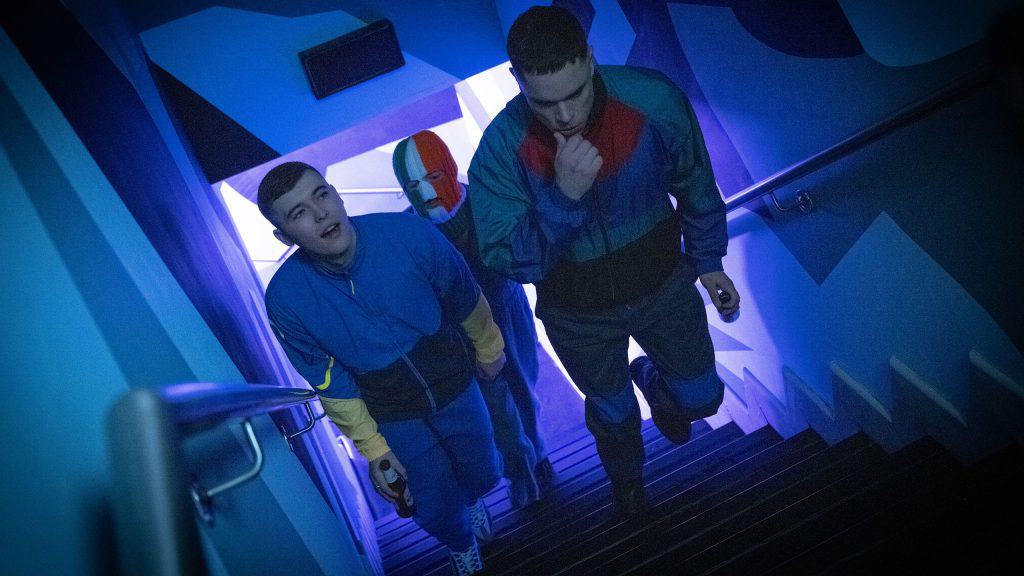Language and how we use our words is one of the essential building blocks of how we identify with the world at large. To try to take this away is tantamount to erasing one’s identity. This has been a particular point of contention for centuries when it comes to the Irish people and their bloody opposition against British rule. Following The Troubles, Ireland has struggled to push off the creep of assimilation. There are a reported 80,000 native Irish speakers in Ireland, and 6,000 live North of Ireland. This may not seem like a lot in the grand scheme of things, but these individuals are the vital remnants of a rich culture, and until recently they have had to fight to have their language recognized as an official language. In his electrifying new film Kneecap, writer-director Rich Peppiatt explores this volatile struggle through a fascinating perspective that unites these disparate threads into something memorable.
One of the most important tools one can use to fight oppression is music, which artists have embraced for countless years. In 2017, hip-hop trio Kneecap emerged out of Belfast performing both in English and their native Irish. Their embrace of their heritage and vocal support of republicanism has made them one of the most vital voices in the music scene in this part of the world. It makes complete sense that a movie would be made about their incredible story. It also makes complete sense that they have no interest in being hemmed in by conventional biopic storytelling that blandly highlights the creation of art without much meaning. No, take a John Carney film (Sing Street, Flora and Son) and blend it up with Trainspotting and you have something more in the ballpark of Kneecap. As the artists take a backseat to their true passion, the film captures what is so compelling about this group.
From the opening moments, the film establishes a frenetic pace and visual language worthy of these radicals. You very quickly get a primer on the state of these characters and Ireland at large while flashy editing keeps you off kilter. Chaos has been a part of their lives since helicopters circled their baptism. This is due to the illegal (and explosive) acts of protest from family patriarch Arlo Ó Cairealláin, played to perfection by Michael Fassbender who lends the film some welcome gravitas. While the screen time for this character is minor, his impact on the narrative could not be higher. Arlo plants the seeds of political discontent within this family that will fully flourish as they transition into adulthood.
The narrative as told in Kneecap is somewhat fictionalized, but it largely stays true to the spirit of their story. The trio – Mo Chara, Móglaí Bap, and DJ Provaí – play themselves which adds an extra dash of unfettered energy that comes from a non-professional actor, although their command of a crowd probably translates to some extent to the camera. The inciting incident comes from the rough-and-tumble Mo Chara and Móglaí Bap crossing paths with the straitlaced music teacher JJ Ó “DJ Próvaí” Dochartaigh when a need for a translator arises during a police interrogation. Both sides are already fighting for Irish rights, only they are doing so in very different ways. When they realize they each offer something that complements the other, Kneecap is formed and the real fun begins.
The film tackles quite a bit in its relatively spry 105-minute runtime. With whatever success or failures the lads may face, there is always the thread of Irish speech throughout and what is a valuable way to support the cause. Kneecap lives a lifestyle of excess with sex and drugs, which is artfully integrated into the aesthetic of the filmmaking through the cinematography of Ryan Kernaghan to put you in their mindset. The group is already in the crosshairs of various factions simply for speaking out for their beliefs, but their debaucherous antics draw criticisms from even like-minded amongst them in the RRAD (Radical Republicans Against Drugs). The police are going for their necks even before they become a proper group, and it only gets worse as things get more personal. Censorship, political provocations, and just general recklessness are omnipresent. Throw in both family and relationship drama, and you have a lot of balls in the air that rarely get dropped.
Kneecap may play only a minor part in the overall social sentiment to their cause, but there is no denying that music has a way of unifying by giving voice to the voiceless along with a sense of community. While the film itself usually keeps you supplied with subtitles for words spoken in Irish, it is not a vital part of the music itself. The performances are filled with such confident energy that you feel the frustration being spit into the mic – this is what has allowed the group to break out internationally in the real world. Rich Peppiatt ensnares their natural charisma through the camera and leaves it all out on the screen. There is an authenticity that is achieved by narrowing the focus of the group and not giving into standard biographical story beats, so much so that you likely would not guess this was a true story if you were not informed. These boundary-pushing artists have ensured that their story is as artistic as they are and not just a condensed Wikipedia summary. It is destined to be a new cult classic.
Kneecap had its World Premiere in the NEXT section of the 2024 Sundance Film Festival.
Director: Rich Peppiatt
Writer: Rich Peppiatt
Rated: NR
Runtime: 105m
Kneecap may play only a minor part in the overall social sentiment to their cause, but there is no denying that music has a way of unifying by giving voice to the voiceless along with a sense of community. While the film itself usually keeps you supplied with subtitles for words spoken in Irish, it is not a vital part of the music itself.
-
GVN Rating 8
-
User Ratings (0 Votes)
0

Dillon is most comfortable sitting around in a theatre all day watching both big budget and independent movies.






